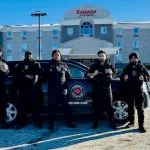
Province provides $2 million for residential school site research
Saskatchewan will allocate funding to assist in searches at residential school sites across the province.
On Friday, First Nations, Métis and Northern Affairs Minister Don McMorris announced $2 million of provincial funding going to the Federation of Sovereign Indigenous Nations (FSIN) for research into undocumented deaths and burials on formerly federally operated residential school locations. McMorris also called on the federal government to match the investment. This follows earlier statements in May that the province and FISN made in demanding the federal government take immediate action after news broke of the discovery of 215 bodies of Indigenous children.
“In the wake of last month’s discovery at the former Kamloops Indian Residential School in British Columbia, it is clear that research and exploration into undocumented deaths and burials must be carried out in Saskatchewan,” McMorris said. “The $2 million announced today by the province of Saskatchewan will help ensure this work can begin, and help bring peace to those who suffered under the residential school system, and peace of mind to those who continue to suffer from its effects. I strongly call upon the federal government to immediately match these funds and help carry out this vitally important work in the province of Saskatchewan.”
Per the media release, the FSIN has already identified the former residential schools of Muskowekwan, Onion Lake St. Anthony’s, Beauval, Guy Hill, Lebret and Sturgeon Landing as possible sites for research., but it is believed that the list of locations First Nations would like to investigate could increase. The funding announced today will be used to support the research into these, and future sites.



